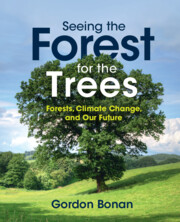Book contents
- Seeing the Forest for the Trees
- Seeing the Forest for the Trees
- Copyright page
- Dedication
- Contents
- Preface
- Part I Historical Perspective
- Part II The Scientific Basis
- 8 Global Physical Climatology
- 9 Forest Biometeorology
- 10 Scientific Tools
- 11 Forest Microclimates
- 12 Water Yield
- 13 Carbon Sequestration
- 14 Forest Macroclimates
- 15 Case Studies
- 16 Climate-Smart Forests
- 17 Forests of the Future
- 18 The Forests before Us
- Notes
- References
- Index
8 - Global Physical Climatology
from Part II - The Scientific Basis
Published online by Cambridge University Press: 02 February 2023
- Seeing the Forest for the Trees
- Seeing the Forest for the Trees
- Copyright page
- Dedication
- Contents
- Preface
- Part I Historical Perspective
- Part II The Scientific Basis
- 8 Global Physical Climatology
- 9 Forest Biometeorology
- 10 Scientific Tools
- 11 Forest Microclimates
- 12 Water Yield
- 13 Carbon Sequestration
- 14 Forest Macroclimates
- 15 Case Studies
- 16 Climate-Smart Forests
- 17 Forests of the Future
- 18 The Forests before Us
- Notes
- References
- Index
Summary
There is a distinct poleward zonation of climate defined by gradations of progressively colder annual mean temperature in tropical, subtropical, temperate, boreal, arctic, and polar latitudes. Additional climate zones are defined based on annual precipitation and the seasonality of temperature and rain. The climate at large spatial scales extending over thousands of kilometers is known as the macroclimate. It is determined by geographic variation in solar heating of the planet, which sets in motion large-scale atmospheric circulations that transport heat poleward from the tropics, and also by proximity to oceans, which similarly transport heat in ocean currents. Mountains and large lakes create a regional climate that can deviate from the macroclimate. Climate at this scale, generally up to a several hundred kilometers , is referred to as mesoclimate. Variation in topography, soils, and vegetation creates local climates at a spatial scale ranging from a few to tens of kilometers, known as microclimates. A south-facing slope has a different microclimate than a north-facing slope. Forests have a different microclimate compared with open land.
Keywords
- Type
- Chapter
- Information
- Seeing the Forest for the TreesForests, Climate Change, and Our Future, pp. 101 - 113Publisher: Cambridge University PressPrint publication year: 2023



